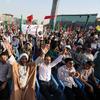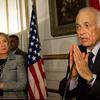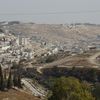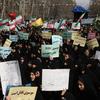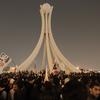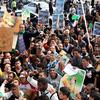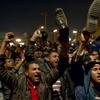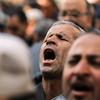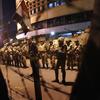Zachary Lockman appears in the following:
Alawites to Yazidis: A Guide to Religious Communities in the Middle East
Friday, August 22, 2014
Which Country Will Define Arab Spring?
Thursday, June 09, 2011
In watching the developments across the Middle East region, there seem to be one of two paths that nations experiencing the Arab Spring can take. Although 800 Egyptians died in revolts leading up to the removal of Hosni Mubarak’s long-standing regime, the country is now on a path toward more democratic rule. The same can’t be said for Libya, Syria or Yemen where entrenched regimes—or a solitary figure, in the case of Muammar Gadaffi—refuse to cede power.
While some call Egypt and Tunisia the shining model for the Arab Spring’s revolutions — isn’t it more accurate to see it as an exception to the rule of civil war?
President Obama to Address Muslim World
Thursday, May 19, 2011
Today President Obama will deliver his first major policy speech to the Muslim World since the beginning popular demonstrations and political revolutions began sweeping across the Middle East and Northern Africa. It's not his first speech on the region. In June, 2009, the president addressed the region from Cairo University, speaking in broad terms in order to reset the relationship with the region following the Bush administration. Today’s Arab world demands a different kind of speech than the one delivered during the commander in chief's first year in office. President Obama will be forced to address specific nations and outline concrete agendas.
Who Determines US Foreign Policy in the Middle East?
Tuesday, April 26, 2011
Since January 25, when a wave of popular protests began to sweep across the Middle East region, the U.S. has been put into several very precarious policy positions. The most obvious question is: should the U.S. stand on the side of revolution and support the protesters seeking new Democratic leadership; or, should we continue to support the incumbent, sometimes brutal, autocratic regimes that have been our long-time allies in the region? The answers aren't always clear.
An Update from the West Bank
Thursday, February 17, 2011
Protests are under way in Ramallah, where protesters are demanding unity from their leaders. On Monday, the Palestinian Cabinet submitted its resignation and President Mahmoud Abbas asked rime Minister Salam Fayyad to form a new government. BBC reporter Jon Donnison, provides a view of what is happening on the ground in the strip of Palestinian territory.
Iranian Government Clamps Down on Protests
Thursday, February 17, 2011
During the protests in Egypt and Tunisia, Iranian President Mahmoud Ahmadinejad's government praised the uprisings, saying that the "era of puppet regimes" had come to an end. In a similar vein this week, opposition groups are saying the government has "co-opted" the February 14th death of university student Saneh Jaleh during marches in Tehran. On Wednesday, funeral services were held by both opposition and pro-government groups. The government has said that Jaleh was an informant, and killed by opposition forces. A pro-government rally is planned for Friday.
Demonstrations Boil in Bahrain
Thursday, February 17, 2011
Three days after the Bahraini “Day of Rage,” Pearl Square is empty of protesters. Riot police cracked down Wednesday night, using tear gas and rubber bullets on sleeping protesters. At least three people have been killed and 300 injured. For the latest on news from that country, we turn to Michael Slackman, foreign correspondent for The New York Times.
Civil Unrest Reaches Libya
Thursday, February 17, 2011
The wave of anti-establishment, pro-democracy demonstrations made its way to Libya on Friday as several cities saw demonstrations against its leader Colonel Muammer Qaddafi. Taking cues from Egypt and Tunisia, Libyans hope to use social networking sites like Twitter and Facebook to mobilize the popular support necessary to topple Qaddafi’s nearly forty-year regime. For their part, Libya’s state run media did not report the domestic uprisings, focusing instead on pro Qaddafi rallies in Tripoli and other cities. Do Libyan protesters have a chance to make a change?
Mubarak Defies Calls for Ouster
Friday, February 11, 2011
A massive crowd has filled the streets of Cairo on day 18 of Egypt's uprising. Thursday night, President Hosni Mubarak announced that he has no intentions of leaving office sparking rage among the crowds of demonstrators. For an analysis of what happens now is Rashid Khalidi, Edward Said professor of Modern Arab Studies at Columbia University, author of “Sowing Crisis: The Cold War and American Dominance in the Middle East” and “Palestinian Identity.”
Must Peaceful Protest Be Abandoned?
Friday, February 11, 2011
President Mubarak's refusal to step down on Thursday turned the mood in Tahrir Square from hopeful anticipation to fury in a matter of minutes. Many see Mubarak's response as a direct rebuff to peaceful protest. Is violence the next (and last) resort?
Update: Uprising in Egypt
Friday, February 11, 2011
Nancy Yousef, Egyptian-American Professor of English Literature at the City University of New York, Baruch and Zachary Lockman, Professor of Middle Eastern and Islamic Studies and History at New York University reflect on the latest from Egypt. Protests in Cairo have sparked protests in other regions of Egypt, sparking dissent among citizens who are not connected to Facebook, but people who are overcoming fears of chaos and lending their voices to the uprising.
Analysis of Events in Egypt
Friday, February 11, 2011
Zachary Lockman, professor of Middle Eastern and Islamic Studies and History at New York University analyzes what he sees happening in Egypt, where throngs have descended on Tahrir Square following President Mubarak's refusal to step down. It seemed that Vice President Omar Suleiman was going to take the place of President Mubarak, but it appears that he is lock step with Mubarak. Lockman says that the old political parties in Egypt have no credibility. He also expresses a wariness that if the regime tries to revive it's security apparatus and use it against the demonstrators, an explosive situation will ensue.
Egyptian Military and Mubarak's True Power
Friday, February 11, 2011
Egypt's autocratic leader, Hosni Mubarak announced his plans to remain president of Egypt, yet, more and more voices begin to consolidate power both inside the government, and outside its walls. Opposition leader Mohamed ElBaradei tweeted out, "Egypt will explode. Army must save country now," in response to Mubarak. Furthermore, some reports suggest Egypt's Army is deeply divided over how to deal with Mubarak. The question now is, how much longer can Mubarak count on the military’s support?
